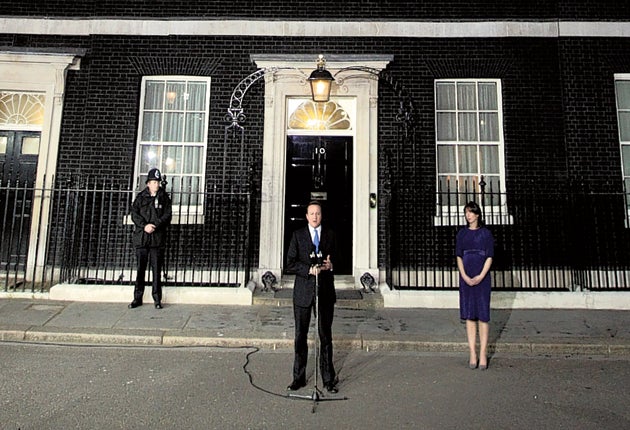Cameron: I didn't think I would become Prime Minister
Andrew Grice reports on the latest revelations about the post-election chaos

Your support helps us to tell the story
From reproductive rights to climate change to Big Tech, The Independent is on the ground when the story is developing. Whether it's investigating the financials of Elon Musk's pro-Trump PAC or producing our latest documentary, 'The A Word', which shines a light on the American women fighting for reproductive rights, we know how important it is to parse out the facts from the messaging.
At such a critical moment in US history, we need reporters on the ground. Your donation allows us to keep sending journalists to speak to both sides of the story.
The Independent is trusted by Americans across the entire political spectrum. And unlike many other quality news outlets, we choose not to lock Americans out of our reporting and analysis with paywalls. We believe quality journalism should be available to everyone, paid for by those who can afford it.
Your support makes all the difference.Twenty-four hours before he moved into Downing Street, David Cameron told his wife he did not think he would become Prime Minister because he was sure the Liberal Democrats would do a deal with Labour.
When the Queen invited him to form a government, Mr Cameron could not tell her whether it would be a coalition or minority government because talks with the Liberal Democrats were still continuing. The revelations come in a BBC Two programme tonight on how the Liberal-Conservative coalition was born.
Over supper in his kitchen with his wife Samantha four days after the 6 May election resulted in a hung parliament, Mr Cameron said he recalls saying: "It's not going to happen. I'm going to be leader of the Opposition. I'm depressed that it hasn't worked out as we wanted it. I'm going to be in opposition for another couple more years."
Despite making a "generous offer" to Nick Clegg's party, he feared it would link up with Labour when the two parties opened rival talks. "On Sunday I was thinking I probably will be Prime Minister on Monday. I was thinking by the end of Monday I definitely won't be Prime Minister," he says.
When an impatient Gordon Brown resigned before the Tories and Liberal Democrats agreed a deal, Mr Cameron was taken by surprise. "I remember having to ring Samantha. She was doing Nancy's homework and I said, 'We could be going to the Palace – you'd better get your frock on'."
On his meeting with the Queen, Mr Cameron tells the BBC's political editor, Nick Robinson: "I went to see Her Majesty and she asked me to form a government and I said I couldn't be totally sure about what sort of government I was going to form. I said that I hoped to form a coalition government but I might have to come back in the morning and tell her it was something rather different."
Sir Menzies Campbell, the former Liberal Democrat leader, warns that Mr Cameron and Mr Clegg might end up looking like each other, in the way that owners look like their dogs. "If you have a coalition partner then it seems to me there's a grave risk eventually you'll come to look like them," he says.
In the programme, Five Days That Changed Britain, Mr Cameron insists he did not mislead his MPs by telling them Labour had offered the Liberal Democrats reform of the first-past-the-post voting system for Westminster without holding a referendum. He was "absolutely certain" Labour had made such an offer and he had argued very strongly with Mr Clegg that reform could not happen without a referendum. Mr Clegg told the programme such an offer "might have been made" but not formally to him.
Yesterday Mr Cameron and Mr Clegg rounded on Labour after it confirmed that it would not support the Bill calling a referendum next May on whether to adopt the Alternative Vote (AV) system. Labour, the only party to support AV at this year's general election, has performed a U-turn because the Bill also includes a plan to cut the number of MPs from 650 to 600 and redraw constituency boundaries – likely to cost Labour about 20 seats.
Jack Straw, the shadow Justice Secretary, said: "If it had just been about the AV referendum, there would have been no difficulty in getting this Bill through. What they have done is added to this Bill their very partisan proposals for gerrymandering boundaries."
Labour's move is unlikely to block the referendum because the Tories and Liberal Democrats enjoy a comfortable overall majority.
Mr Cameron accused Labour of descending into "complete and utter opportunism". He said: "They are the one party who in their manifesto had a commitment to the AV referendum and they are now backtracking on that. I know what it is like in opposition. The temptation to jump on the bandwagon and be opportunistic is always there."
Join our commenting forum
Join thought-provoking conversations, follow other Independent readers and see their replies
Comments